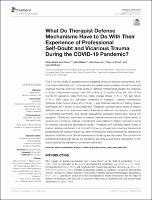Please use this identifier to cite or link to this item:
https://hdl.handle.net/20.500.12202/9320| Title: | What do therapist defense mechanisms have to do with their experience of professional self-doubt and vicarious trauma during the COVID-19 pandemic |
| Authors: | Aafjes-Van Doorn, Katie Békés, Vera Luo, Xiaochen Prout, Tracy A. Hoffman, Leon 0000-0003-2584-5897 |
| Keywords: | defense mechanisms therapist COVID-19 vicarious trauma professional self-doubt |
| Issue Date: | 2021 |
| Publisher: | Frontiers Media S.A. |
| Citation: | Aafjes-Van Doorn, K., Békés, V., Luo, X., Prout, T. A., & Hoffman, L. (2021). What do therapist defense mechanisms have to do with their experience of professional self-doubt and vicarious trauma during the covid-19 pandemic? Frontiers in Psychology, 12. https:// www.frontiersin.org/article/10.3389/fpsyg.2021.647503 |
| Series/Report no.: | Frontiers in Psychology;12 |
| Abstract: | This is the first study to examine psychotherapists’ levels of defense mechanisms, their concurrent relationship with professional work-related stress (professional self-doubt and vicarious trauma), and how their levels of defense mechanisms predict the changes in these professional stresses over the course of 3 months since the start of the COVID-19 pandemic. Data from two online studies (Study 1; N = 105 and Study 2; N = 336), using two self-report measures of therapists’ defense mechanisms (Defense Style Questionnaire-40 in Study 1 and Defense Mechanism Rating Scales Self-Report-30 in Study 2), are presented. Therapists reported higher levels of mature defense mechanisms, and lower levels of immature defense mechanisms, compared to published community and clinical populations assessed before and during the pandemic. Therapists’ lower level of mature defense mechanisms and higher levels of neurotic and immature defense mechanisms were related to higher concurrent levels of vicarious trauma and professional doubt. Therapists who reported higher levels of mature defense mechanisms at 3-month follow-up showed less vicarious trauma and professional self-doubt at follow-up, after controlling for these professional stressors at baseline. Implications for clinical supervision and training are discussed. The context and professional challenges during the pandemic are unique and future replications of the results outside the pandemic context are warranted. |
| Description: | Scholarly article / Open Access |
| URI: | https://www.frontiersin.org/articles/10.3389/fpsyg.2021.647503/full https://hdl.handle.net/20.500.12202/9320 |
| ISSN: | ISSN 1664-1078 |
| Appears in Collections: | Ferkauf Graduate School of Psychology: Faculty Publications |
Files in This Item:
| File | Description | Size | Format | |
|---|---|---|---|---|
| Aafjes-Van Doorn Therapist Defense fpsyg-12-647503.pdf | 278.78 kB | Adobe PDF |  View/Open |
This item is licensed under a Creative Commons License

